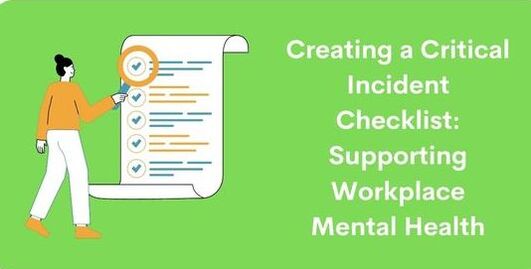|
In today's fast-paced and dynamic work environments, critical incidents can occur unexpectedly, leaving a profound impact on employees' mental health and well-being. A critical incident refers to any unexpected event, such as accidents, natural disasters, workplace violence, or sudden tragic incidents, that significantly disrupts the normal course of operations and affects the emotional stability of individuals involved. As a workplace well-being and mental health specialist, we understand the gravity of these incidents and emphasize the need for organizations to implement a comprehensive Critical Incident Checklist. This checklist is designed to equip leaders with actionable steps to support their teams' mental health in the aftermath of a critical incident.
Defining Critical Incidents and Their Workplace Impact: Critical incidents have the potential to create immense stress, anxiety, and trauma among employees. These incidents often result in feelings of fear, helplessness, and vulnerability, making it challenging for individuals to cope with the situation effectively. The workplace itself may undergo a significant disruption, affecting productivity and morale. Employees may experience difficulties concentrating, increased absenteeism, and strained interpersonal relationships. Importance of a Critical Incident Checklist: Having a structured Critical Incident Checklist is vital for organizations to respond promptly and effectively to such challenging situations. This checklist serves as a guide for leaders, enabling them to provide timely and appropriate support to their teams during this emotionally demanding period. By having a well-defined plan, leaders can demonstrate their commitment to employee well-being and foster a supportive work culture that acknowledges the importance of mental health. Key Inclusions in the Critical Incident Checklist:
Introducing the Critical Incident Checklist across the organization requires careful planning and implementation. Collaborating with a workplace mental health consultant is highly recommended to ensure its success. A mental health consultant can help tailor the checklist to the specific needs and culture of the organization, providing expert guidance on developing effective strategies. The rollout should include comprehensive training sessions for all leaders and management personnel. These sessions should educate them on recognizing the signs of distress, utilizing the checklist effectively, and addressing mental health concerns empathetically. Prioritizing the mental health of employees during critical incidents is essential for creating a supportive and resilient work environment. The implementation of a well-crafted Critical Incident Checklist equips leaders with the necessary tools to respond promptly and compassionately to their teams' emotional needs. As a workplace well-being and mental health specialist, we advocate for working with a workplace mental health consultant to develop and implement the checklist successfully. By taking proactive steps to support employees during difficult times, organizations can foster a culture that values mental health and well-being as integral components of overall workplace wellness.
0 Comments
|

 RSS Feed
RSS Feed